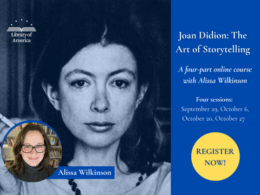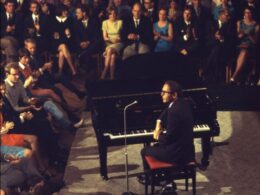Guest blog post by Penelope Niven, author of the biography Thornton Wilder: A Life (HarperCollins, 2012).
I have the instinctive habit-formed impulse, at any unoccupied moment during the day, to reach for a book to read . . . .
—Thornton Wilder, Journal Entry 24, May 21, 1940
“Dear Papa,” Thornton Wilder wrote when he was nine. “Books I have read this month.” He listed Shakespeare’s Othello, John White’s translation of Plutarch’s Lives, Washington Irving’s Sketch Book, Wilbur Fist Crafts’s Successful Men of Today, and Sarah Knowles Bolton’s Poor Boys Who Became Famous. Thornton concluded with his opinion: “None of the books were unsatisfactory.”
Two of the books would have particularly satisfied his father, Dr. Amos Parker Wilder, journalist, orator, diplomat, and temperance advocate. American authors Crafts and Bolton were leaders in the temperance movement and wrote prolifically for children, hoping to instill in them such virtues as obedience, punctuality, hard work, and, of course, abstinence.
Thornton, his brother, Amos, and their three sisters grew up being read to—the Bible, and works by Bunyan, Scott, Dickens, Thackeray, Thoreau, James Fenimore Cooper, and John Greenleaf Whittier. On Sunday afternoons their father read to his precocious children from “edifying” books on religion, philosophy, history, and civics. On other days, their mother, a poet and lover of the arts, read mythology to them, or poetry, fiction, and drama. Thornton eagerly read every genre. His father encouraged him to read biography, not only the didactic children’s books about poor boys growing up to be famous, but Boswell’s life of Samuel Johnson and the four-volume biography of abolitionist William Lloyd Garrison. When Thornton was twenty-eight and working on The Cabala, his first novel, he wrote, “I never cry for fiction (save when I’m composing it) but I weep myself ill over biography.”
During their high school and college years, Dr. Wilder dispatched his sons to do summer work on farms, believing the experience provided a wider understanding of grassroots America. In the summer of 1916, afflicted with mosquito bites, bedbugs, and sunburn, Thornton worked six ten-hour days a week, at fifteen cents per hour, on a farm in Massachusetts. After the day’s work, he escaped into books. He was so captivated by J. M. Barrie’s plays that he read “to the cows in the stanchions the judge’s speech from Barrie’s The Legend of Leonora.” Thornton’s grounding in biblical literature came in handy another summer when he worked as entertainment director in a Connecticut camp for boys. On Sunday nights he told the boys Bible stories, and because many of them had “never heard of Goliath or Esau or Belshazzar,” he said, they gave him “credit for a great deal of talent.”
From boyhood Thornton was writing plays and stories, fed by his eclectic reading. He noted in his letters and journals the books he read and the writers who absorbed his attention. As an adult, he often read a book once for sheer pleasure, and then re-read it analytically, dissecting it and retrieving the techniques or themes he wanted to try with his own hand. He was schooling himself in the demanding arts of drama and fiction.
He read globally, exploring cultures through their books and working on his Latin, French, German, Italian, and Spanish proficiency so that he could read a text in its original language. He didn’t want another person to stand between him and the author. Books could be bridges to friendship with other American authors—Hemingway, Fitzgerald, Glenway Wescott, Alexander Woollcott, Mabel Dodge Luhan, and Edmund Wilson, among others. In 1934, Thornton met Gertrude Stein and embarked on one of the most important literary friendships of his life. Before they met, he had read Stein’s work closely enough to write a wicked parody of her style, but from 1935 until Stein’s death in 1946, he was the American champion and interpreter of her work.
In his fifties Wilder concentrated on books by nineteenth-century American authors. He was appointed Charles Eliot Norton Professor of Poetry at Harvard for 1950–51, to give a series of lectures he called “The American Characteristics in Classic American Literature.” He turned his prodigious intellectual energy to the mission he set for himself: “To interpret the American experience and the American character as revealed in nineteenth century American literature; to define what it meant to be an American in the twentieth century; and to examine the role of America and Americans in the global community.”
He filled his journals with research and reflections about nineteenth-century American authors and their significance in American life, enough material for the nonfiction book he dreamed about writing but never finished. He was immersed in the work of Whitman, Poe, Melville, Henry James, Thoreau, and Dickinson. He excluded Emerson. “Isn’t he awful?” Wilder wrote to Malcolm Cowley.
Yet how that colossus bestrode the world for so long! His ideas basely, soothingly, flattering all that is facile and evasive in the young republic . . . Melville’s copies of the Essays are in the Harvard Library and it’s a joy to see how Melville dug his pencil into the page in scornful annotation.
Wilder much preferred Thoreau. “Walden,” he wrote, “is a manual of self-reliance so much more profound than Emerson’s famous essay that the latter seems to be merely on the level of that advice to melancholics which directs them to take walks and drink a lot of milk.” Three of Wilder’s lectures were published in the Atlantic Monthly in 1952: “Toward an American Language,” “The American Loneliness,” and “Emily Dickinson,” a biographical portrait articulating a fundamental theme in Wilder’s own work—the importance of “loving the particular while living in the universal.”
By the time he was seventy-eight his vision was failing, and Wilder could not read as copiously as he had always loved to do. Nevertheless, in the months before his death in December 1975, he “devoured with joy” Lewis Thomas’s The Lives of a Cell and James D. Watson’s The Double Helix. “What sublime reaches,” he told his brother, adding that he was “glad to have lived long enough to peek into these processes.”
Back in 1926, when he was a young man, Wilder had reflected that “the whole purport of literature” is “the notation of the heart”—a line he wrote in a letter to his former schoolmate Henry Luce, and then embedded in a passage in The Bridge of San Luis Rey. That maxim held true for Thornton Wilder for a lifetime of writing—and a lifetime of reading.



